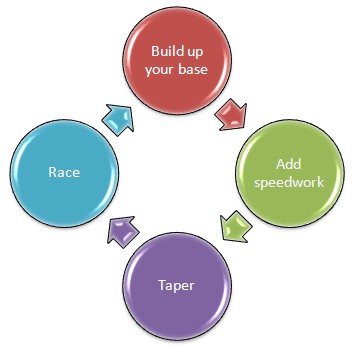The Principles of Periodization - The Secret Running Tip to Peak Performance
Periodization is necessary to get yourself to peak performance for the right race at the right time.It's THE running tip that will really help set you apart from the bulk of the runners.
Many people do the same-old running at any given time of the year. You can outrun faster runners than you, when you practice these periodization running tips!
Running Tip #1: Cut Your Running Program Into Blocks
Periodization is the concept of cutting your running program into different blocks.
In each block you devote your attention to specific types of running.
You do this to optimally prepare yourself for your goal race.
Different trainers approach these blocks, these running training phases, differently and use different names for them.
However, it all pretty much comes down to the same thing. In general we identify the following blocks:

It's also important to recharge every now and then, take a short break from running, to come back recharged and ready to roar again.
Running Tip #2: Learn from the Big Boys
Whenever you pick up a good running training book, it will inevitably spend a lot of time explaining the concepts of periodization.
A great general running training book,Daniels' Running Formula, explains periodization very well. Daniels tells you how long each phase should be depending on the total length of your running program and the race distance.
Per race distance, he exactly tells you what you should do. He identifies the following phases:
As you see, this is not too dissimilar from the running training blocks identified earlier on.
Running Tip #3: Make Each Run Count - Or Not?
The other part in which many of us go wrong is to have the tendency to make each run count.
What I mean by that, is that many of us go hell for leather every single run.
Why is this bad?
Well, a general rule is that when you have a training schedule set up, you alternate hard and easy days. A hard day is generally a quality workout day, e.g. tempo, interval, long run.
An easy day would be a day of no running, a recovery run or cross-training.
Many of us who go out every day don't really apply the concept of recovery runs. Many of these so-called recovery runs turn out to be semi-hard days.
The result of that is that your hard running workout is also not optimal. Because you haven't fully recovered, your hard workout is not as fast or as long as it should be.
So, you end up doing semi-hard after semi-hard after semi-hard workout, which leads to sub-optimal performance.
One of the hardest parts of running training is to know when to take a rest and when to go for it!

Running Tip #4: Know Which Type of Running is More Important for Your Race
Now, the difficult part is of course, what is most important in each phase / each running block?
This depends a lot on the race you are training for.
When you are preparing for a marathon, your focus will be more on longer, slower runs. When you are preparing for a 5k, intervals are more important.
It does not mean that you don't do any intervals when you are preparing for a marathon. And it doesn't mean you don't do any long runs when training for a 5k.
But your running program will definitely look and feel significantly different.
Periodization is key to achieving the absolute best! So, apply the above in a smart running training program! It's not all about running hard or running as much as possible. To get the most out of your running, smart scheduling of the right type of workouts at every stage of your race preparation is massively important.
Need help with setting up a world-class running program? Check out my coaching service. I'd be delighted to start working with you!
Home > Running Training > Periodization




